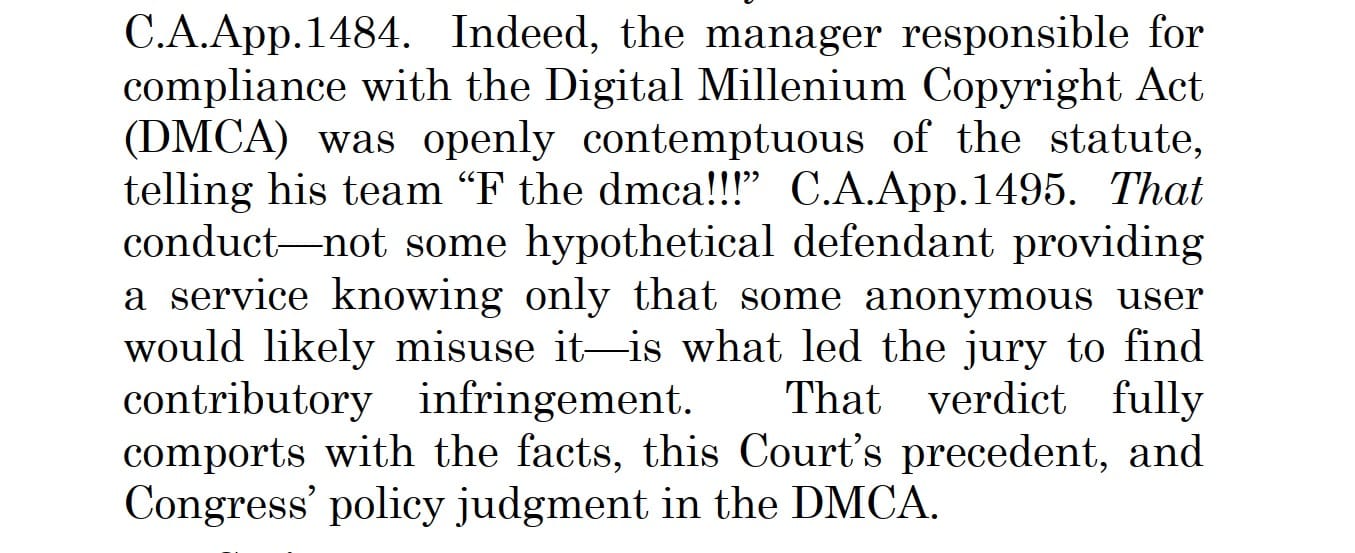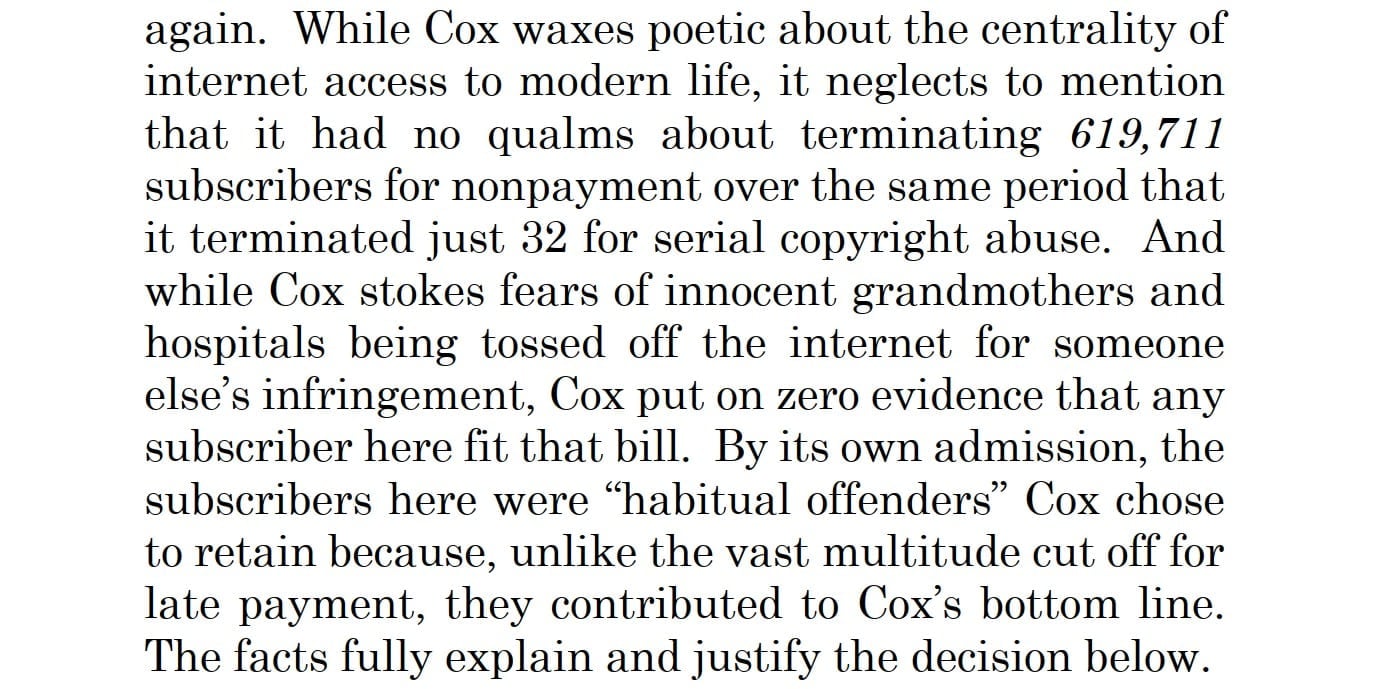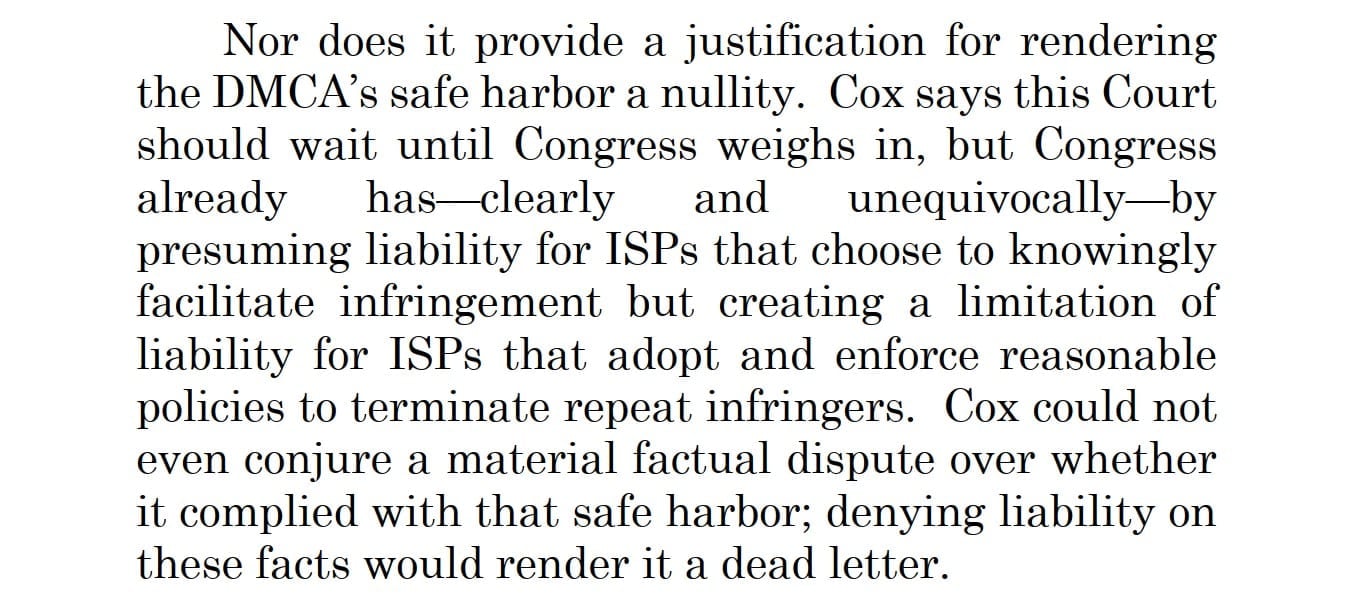 The Supreme Court case between several major record labels and Cox Communications is a landmark legal battle.
The Supreme Court case between several major record labels and Cox Communications is a landmark legal battle.
The outcome will determine how Internet providers should deal with pirating subscribers on their networks.
Should alleged pirates be disconnected from the Internet after repeated third-party allegations of copyright infringement? Or does that go too far?
In its opening brief, Cox argued that the company should not be held liable for contributory copyright infringement because it failed to terminate subscribers after multiple warnings. The U.S. Government and various tech companies support Cox’s position.
Record Labels Fire Back in Supreme Court
Yesterday, the major record labels, including Sony and Universal Music, countered these arguments in their response brief. Describing Cox as a company that willingly prioritized profits over piracy, they argued that the $1 billion verdict against the ISP should be upheld.
Citing internal communication records handed over by Cox during discovery, the labels said that Cox viewed potential terminations through a commercial lens.
“Cox made a deliberate and egregious decision to elevate its own profits over compliance with the law, supplying the means for massive copyright infringement to specific users that it knew were ‘habitual offenders’ because ‘we want to hold on to every subscriber we can’,” the labels said.
To illustrate this stance, the labels quoted comments made by a Cox manager. He was responsible for the company’s compliance with the DMCA but told his team, “F the dmca!!!”.

The labels claim that it was this context that eventually led the Virginia jury to hold the company liable, and they see no reason why the Supreme Court should reverse the decision.
Termination Hypocrisy
A key issue highlighted by Cox and the U.S. Government is the risk of innocent subscribers having their Internet access terminated over third-party piracy allegations.
The record labels don’t dispute the importance of Internet connectivity, but after disconnecting hundreds of thousands of subscribers who didn’t pay their bills, they claim that Cox’s stance is hypocritical.
“While Cox waxes poetic about the centrality of internet access to modern life, it neglects to mention that it had no qualms about terminating 619,711 subscribers for nonpayment over the same period that it terminated just 32 for serial copyright abuse. And while Cox stokes fears of innocent grandmothers and hospitals being tossed off the internet for someone else’s infringement, Cox put on zero evidence that any subscriber here fit that bill.”

Contributory Liability is ‘Bedrock Law’
A key question before the Supreme Court is whether ISPs can be held contributorily liable. According to Cox and the U.S. government, they should not if there is no culpable action that facilitates copyright infringement.
According to the labels, Cox’s decision to ignore piracy and prioritize profits qualifies as culpable conduct.
The music companies note that contributory infringement is bedrock law that dates back more than a century. It has previously been applied to cases where parties supplied products that were used for copyright infringement.
They cite a 1912 case (Henry v. A.B. Dick Co.) where the Supreme Court held that selling mimeograph ink to a known infringer “with the expectation that it would be used” to infringe was enough for liability. The labels argue that Cox continuing to provide internet service to known “habitual offenders” is the modern equivalent.
DMCA’s Safe Harbor Presupposes Liability
One of the labels’ critical counterarguments is that the very existence of the DMCA’s safe harbor for ISPs suggests that Congress understood that these services could be held liable for their subscribers’ infringements.
The labels note that the U.S. government’s concern, that ISPs would be more inclined to avoid liability and terminate customers without much scrutiny, could also be turned on its head.
While terminations of alleged pirates are clearly seen as a problem by Cox and the U.S., disconnecting subscribers that refuse to pay their bills isn’t mentioned as a concern.
“All of that makes the government’s professed concern about not ‘giv[ing] ISPs a powerful incentive to err on the side of termination,’ mystifying. Cox itself had no hesitation about erring on the side of termination when it came to late-paying customers.
“And Congress acted to curb the true problematic incentive—namely, that ISPs’ profit motives will leave them with ‘a powerful incentive to err on the side’ of retaining known infringers as long as they pay their monthly bills,” the labels added.

According to the labels, the DMCA safe harbor would be a “nullity” or “nonsensical” if there were no underlying liability to be shielded from. The provision, which requires ISPs to implement a reasonable policy to terminate repeat infringers, was created to “incentiv[ize]” ISPs to cooperate.
Finally, the labels add that the jury also correctly held that Cox’s actions were willful. The extensive internal discussions about the DMCA and the legal risk show Cox was fully aware of the law and its potential liability, but simply decided to give its profits priority.
With the main briefs from both sides now filed, the Supreme Court is scheduled to hear oral arguments from Cox, the record labels, and possibly the U.S. Government later this fall. A final decision on the billion-dollar verdict, which will define the responsibilities of Internet providers in the digital age, is expected next year.
—
A copy of the record labels’ brief, submitted yesterday to the Supreme Court, is available here (pdf)
From: TF, for the latest news on copyright battles, piracy and more.
Powered by WPeMatico
